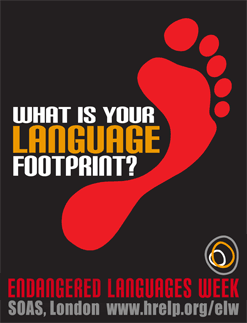One of the events which featured in Endangered Languages Week 2008 at SOAS was called What is your language footprint?. This concept of a Language Footprint and the ideas behind it were developed by David Nathan, and presented by his team that also included Chaithra Puttaswamy and Juliette Rutherford (Tom Castle created the dramatic poster).
It has since attracted the attention of several bloggers, including Bulanjdjan (Langguj Gel) and Hoyden about town.
The basic concept is simple. A language footprint is the influence of those speaking a dominant language on the behaviour of speakers of other languages. In any communication, if your choice of language makes another person shift from their language to yours, you have made a language footprint. The concept is intended as a metaphor similar to the”carbon footprint”notion and, like it, includes the potential that individuals can reduce or offset their language footprint. You can reduce your language footprint by:
- learning other languages, especially less commonly spoken languages or those of places to be visited
- employing a local translator
- speed-learn a language while you fly
- supporting other languages by buying books in them
- encouraging companies to do marketing and make packaging in local languages everywhere, employing local people to do the translations
- avoiding products and activities that give people no choice other than to use dominant languages
Speakers of large languages can offset their language footprint by:
- supporting increased language learning in your own country
- switching holidays to places where your language is not intrusive
- sponsoring efforts towards language maintenance in other communities
- supporting another person to learn a language
- learning about the world’s diversity of languages
- helping to make others aware of the problem of language endangerment
The metaphor also has a positive side: bilingual speakers of a minority language can take an individual decision to increase and balance their language footprints by making a choice to speak their smaller language whenever it is appropriate to do so, eg. when interacting with other bilingual minority language speakers, shopping in bilingual markets etc. (This aspect of the language (or linguistic) footprint idea has been promoted for Welsh by Estyn Llaw and the Welsh National Health Service under the slogan”Camau bach – cynnydd mawr”. A different version in favour of using local languages is promoted by Microsoft as a benefit of making software products World-ready.)
The Language Footprint concept is not intended as an academically supported theory but is an unashamedly populist marketing tool to focus attention on individual language choices, and the potential to reduce pressures for language shift at the point of actual interactions in the world, ie. conversations between people. It is not primarily aimed at helping linguists understand what is happening, it is aimed at helping to stop what is happening by influencing the wider public. It also moves away from the other metaphors that have been associated with endangered languages and language diversity, all of which are negative in their framing: language death, loss of diversity, threats to linguistic human rights, break in intergenerational transmission, and so on. It rather moves towards something concrete that individuals can choose to do.
The event at SOAS where Language Footprints were discussed was presented as a debate, and to the extent that there were concrete “no” arguments, they centred around a concern for sensitivity to socio-linguistic context that many linguistically unsophisticated majority language speakers might not be expected to have. For example, as noted by some of the commentators to the Hoyden about town blog post, in some countries, like The Netherlands or Sweden, attempting to use the local language in lieu of English, say, will result in a response in English because of a local language ideology that assumes foreigners will speak the lingua franca rather than the local language. In other countries where interlocutors want to improve their world language skills (eg. Japan, China) insisting on speaking the local language may seem to be odd, if not bloody minded. For some indigenous communities where language use is tied up with language ownership (and hence attempting to learn the local language is seen as appropriation) it would be also inappropriate for outsiders to attempt to use the local tongue. The difference between”language footprint”and”carbon footprint”is that the former arises in the context of human interaction which brings with it all the social and political context within which such interaction is embedded. Carbon footprints have much less to do with interaction.
Still, as a hook for capturing the interest of the general public it is probably a pretty snazzy idea.
Note: My thanks to David Nathan, Julia Sallabank and Peter Sutton for discussion and clarification of concepts and arguments on this topic.
 Follow
Follow
Well, it looks like Google Research is doing their bit to support smaller languages by adding ten more languages to Google Translate. However, as blogger keola points out email offers to add an endangered language, ie. Hawaiian, to Google Translate have gone unanswered. C’mon Google, you can do better with your language footprint.
However, see Bill Poser’s post Google Translate Adds Languages and the comments thereon. A large amount of (digital) bilingual text is a requirement.